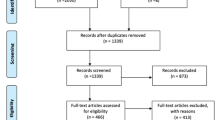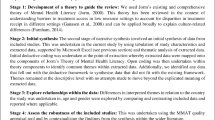Abstract
If persons with phenylketonuria (PKU) do not start a protein restricted diet in early infancy, they will suffer severe brain damage. Previous qualitative research on adults and adolescents with PKU has identified stigmatization, uncertain risk perceptions, considerable time spent on preparing food, and incongruence between the PKU diet and certain lifestyle demands. The aim of this study was to explore young and early treated Norwegian adults’ experiences, by conducting in-depth interviews in 2011 with 11 adults with PKU, aged 20–30. Being the first qualitative study on people with PKU in Norway, the process was inspired by grounded theory. All participants reflected on their own health and existence by expressing positive counterfactual thoughts. They considered themselves lucky to have had parents who had managed the diet, they were grateful for the time and place they were born, and for information and treatment availability, although the results also show some ambiguous attitudes towards the hospital which provided the treatment. The expression of gratitude in association with having PKU suggests a major positive coping strategy. It contributes to a more holistic understanding of the experiences and attitudes of young, Norwegian adults with PKU, as it provides a counterweight to the negative experiences.
Similar content being viewed by others
References
Becker, H. S. (1998). Tricks of the trade: How to think about your research while you’re doing it. Chicago: University of Chicago Press.
Budych, K., Helms, T. M., & Schultz, C. (2012). How do patients with rare diseases experience the medical encounter? Exploring role behavior and its impact on patient–physician interaction. Health Policy, 105(2–3), 154–164. doi:10.1016/j.healthpol.2012.02.018.
Christ, S. E. (2003). Asbjorn Folling and the discovery of phenylketonuria. Journal of the History of the Neurosciences, 12(1), 44–54. doi:10.1076/jhin.12.1.44.13788.
Di Ciommo, V., Forcella, E., & Cotugno, G. (2012). Living with phenylketonuria from the point of view of children, adolescents, and young adults: a qualitative study. Journal of Developmental and Behavioral Pediatrics, 33(3), 229–235. doi:10.1097/DBP.0b013e3182460d8a.
Diesen, P. S., Wiig, I., Grut, L., & Kase, B. F. (2014). Betwixt and between being healthy and ill: the stigma experienced by young adults with phenylketonuria. Scandinavian Journal of Disability Research, 1–14. doi: 10.1080/15017419.2014.941003
Eaton, R. J., Bradley, G., & Morrissey, S. (2013). Positive predispositions, quality of life and chronic illness. Psychology, Health & Medicine, 19(4), 473–489. doi:10.1080/13548506.2013.824593.
Eijgelshoven, I., Demirdas, S., Smith, T. A., van Loon, J. M. T., Latour, S., & Bosch, A. M. (2013). The time consuming nature of phenylketonuria: a cross-sectional study investigating time burden and costs of phenylketonuria in the Netherlands. Molecular Genetics and Metabolism, 109(3), 237–242. doi:10.1016/j.ymgme.2013.05.003.
Emmons, R. A. (2007). Thanks!: How the new science of gratitude can make you happier. New York: Houghton Mifflin Harcourt.
Frank, N., Fitzgerald, R., & Legge, M. (2007). Phenylketonuria--the lived experience. The New Zealand Medical Journal, 120(1262), U2728.
French, M., & Smith, G. (2013). ‘Health’ surveillance: new modes of monitoring bodies, populations, and polities. Critical Public Health, 23(4), 383–392. doi:10.1080/09581596.2013.838210.
Giddens, A. (1991). Modernity and self-identity: Self and society in the late modern age. Cambridge: Polity Press.
Glaser, B. G. (1998). Doing grounded theory: Issues and discussions. Mill Valley: Sociology Press.
Glaser, B. G., & Strauss, A. L. (1967). The discovery of grounded theory: Strategies for qualitative research. New York: Aldine de Gruyter.
Grut, L., & Kvam, M. H. (2012). Facing ignorance: people with rare disorders and their experiences with public health and welfare services. Scandinavian Journal of Disability Research, 15(1), 20–32. doi:10.1080/15017419.2011.645870.
Newman, S., Steed, L., & Mulligan, K. (2004). Self-management interventions for chronic illness. The Lancet, 364(9444), 1523–1537. doi:10.1016/S0140-6736(04)17277-2.
Schieppati, A., Henter, J.-I., Daina, E., & Aperia, A. (2008). Why rare diseases are an important medical and social issue. The Lancet, 371(9629), 2039–2041. doi:10.1016/S0140-6736(08)60872-7.
Seligman, M. E. P. (2008). Positive Health. Applied Psychology, 57, 3–18. doi:10.1111/j.1464-0597.2008.00351.x.
Teigen, K. H. (1997). Luck, envy and gratitude: it could have been different. Scandinavian Journal of Psychology, 38(4), 313–323. doi:10.1111/1467-9450.00041.
ten Hoedt, A. E., de Sonneville, L. M., Francois, B., ter Horst, N. M., Janssen, M. C., Rubio-Gozalbo, M. E., . . . Bosch, A. M. (2011). High phenylalanine levels directly affect mood and sustained attention in adults with phenylketonuria: a randomised, double-blind, placebo-controlled, crossover trial. Journal of Inherited Metabolic Disease, 34(1), 165–171. doi: 10.1007/s10545-010-9253-9
The Norwegian Directorate of Health. (2011). Sjeldne diagnoser. 2014, from http://helsedirektoratet.no/helse-og-omsorgstjenester/sjeldne-tilstander/Sider/default.aspx
Trefz, F. K., van Spronsen, F. J., MacDonald, A., Feillet, F., Muntau, A. C., Belanger-Quintana, A., . . . Gasteyger, C. (2014). Management of adult patients with phenylketonuria: survey results from 24 countries. European Journal of Pediatrics. doi: 10.1007/s00431-014-2458-4
Vegni, E., Fiori, L., Riva, E., Giovannini, M., & Moja, E. A. (2010). How individuals with phenylketonuria experience their illness: an age-related qualitative study. Child: Care, Health and Development, 36(4), 539–548. doi:10.1111/j.1365-2214.2009.01000.x.
Visser, M. (2009). The gift of thanks: The roots and rituals of gratitude. Boston: Houghton Mifflin Harcourt.
Wood, A. M., Froh, J. J., & Geraghty, A. W. (2010). Gratitude and well-being: a review and theoretical integration. Clinical Psychology Review, 30(7), 890–905. doi:10.1016/j.cpr.2010.03.005.
Acknowledgments
I would like to express my gratitude to the participants in this study, who shared their personal thoughts and experiences and made the project possible. I thank my colleagues Charlotte von der Lippe, Ingrid Wiig and Susan Jane Sødal, who have been very helpful in the process, and a special thanks to Lena Fauske for her useful comments.
Author information
Authors and Affiliations
Corresponding author
Ethics declarations
ᅟ
Conflict of Interest
The author declares that she has no conflict of interest.
Human Studies and Informed Consent
All procedures performed in the study were in accordance with the ethical standards of the institutional and national research committee, and with the 1964 Helsinki declaration and its later amendments. Informed consent was obtained from all individual participants included in the study.
Animal Studies
No animal studies were carried out by the authors for this article.
Rights and permissions
About this article
Cite this article
Diesen, P.S. “I Feel Lucky” – Gratitude Among Young Adults with Phenylketonuria (PKU). J Genet Counsel 25, 1002–1009 (2016). https://doi.org/10.1007/s10897-015-9931-8
Received:
Accepted:
Published:
Issue Date:
DOI: https://doi.org/10.1007/s10897-015-9931-8




